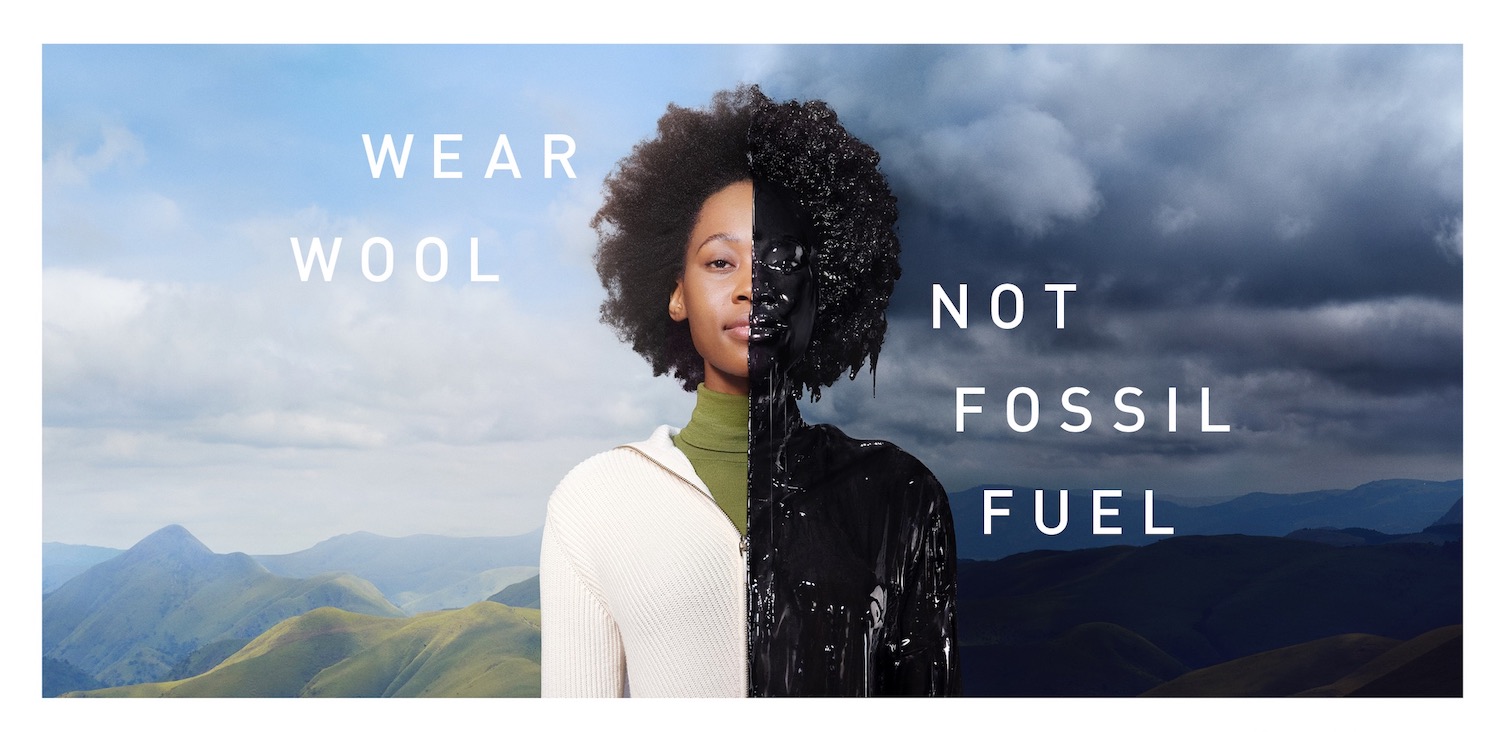
Polyester under attack at COP26
The Woolmark Company addresses dangers of synthetic fibres in a new global launch.

5th September 2022
Knitting Industry
|
Australia
The Woolmark Company’s environmentally focused new global brand initiative ‘Wear Wool, Not Fossil Fuel’ aims to educate citizens about the hidden impact of synthetic fibres on the environment and how choosing natural fibres such as wool can be a solution to reducing fashion’s impact.
Research conducted by The Woolmark Company has shown that while more than one third of global consumers say they are willing to pay more for sustainability, fibre consideration does not feature in the purchase journey at all.1
Furthermore, the research highlighted that consumers are not making the link between synthetic fibres and fossil fuels.
Featuring a series of powerful visual messages that highlights the link between fabrics made from synthetic fibres and the crude oil used in its manufacture, the work is tailored to film and OOH, with initial activity scheduled in the US, UK, France and Australia for September.
The launch centres around a 60-second hero film showing people struggling to escape an oil-filled swimming pool, based on the insight that every 25 minutes, an Olympic pool’s worth of crude oil is used to produce synthetic clothing, which amounts to almost 350 million barrels per year.
The film is accompanied by visually immersive and striking anamorphic digital out-of-home (DOOH) messaging in iconic sites in London’s Piccadilly Circus and New York’s Times Square, along with global OOH, a WeTransfer partnership, digital and social touchpoints, plus a microsite, providing a one-stop-shop to understand the scientific evidence behind the benefits of choosing wool over synthetics fibres.
Written and produced in creative collaboration between Park Village, 20something and Studio Birthplace (consisting of directors Sil Van Der Woerd & Jorik Dozy), whose award-winning portfolio includes their recent Cannes Lions & D&AD winning work Wasteminster: A Downing Street Disaster for Greenpeace UK.
“It is predicted that in just ten years’ time, 73% of the entire clothing market will be made from synthetic fibres, which are derived directly from fossil fuels,” said The Woolmark Company Managing Director John Roberts. “The impact these clothes have during the use and end of life stages of their lifetime cannot be underestimated. In fact, it’s been said that the equivalent of 50 billion plastic bottles’ worth of microfibres enter wastewater every year just from washing. Science shows that wool fibres biodegrade in both land and marine environments, so we know that Merino wool does not contribute to microplastic pollution.”
“Studies also show that wool clothes are amongst the oldest in wardrobes, with high levels of reuse and donation, along with high levels of recycling and commercially viable end-of-life pathways. These factors alone indicate why choosing clothes made from natural fibres, such as Merino wool, are so important in transitioning to a circular, slow fashion model.”
Fran Docx, strategy partner, 20something, said: “Back in 1980, our wardrobes were filled with natural materials like cotton, wool and cashmere. These natural fibres made up 60% of the market, far outstripping the relatively new polyester and polyamide alternatives. The rise of fast fashion, Instagram outfit culture and turbocharged consumerism has seen a wholesale shift in what lurks in our wardrobes. We rarely make a wider ecological connection between clothes, the fibres they’re made of, and the impact on the planet. Our ambition for our work with The Woolmark Company is to address that and raise awareness of the alternatives to synthetic fabrics.”
Watch the film…
The Woolmark Company is the global authority on wool. Through our extensive network of relationships spanning the international textile and fashion industries, we highlight Australian wool’s position as the world’s premium, sustainable fibre that is optimal for circular, traceable products.
The Woolmark logo is one of the world’s most recognised and respected brands, providing assurance of the highest quality, and representing pioneering excellence and innovation from farm through to finished product.
The Woolmark Company is a subsidiary of Australian Wool Innovation, a not-for-profit enterprise that conducts research, development and marketing along the worldwide supply chain for Australian wool on behalf of about 60,000 woolgrowers that help fund the company.

Business intelligence for the fibre, textiles and apparel industries: technologies, innovations, markets, investments, trade policy, sourcing, strategy...
Find out more